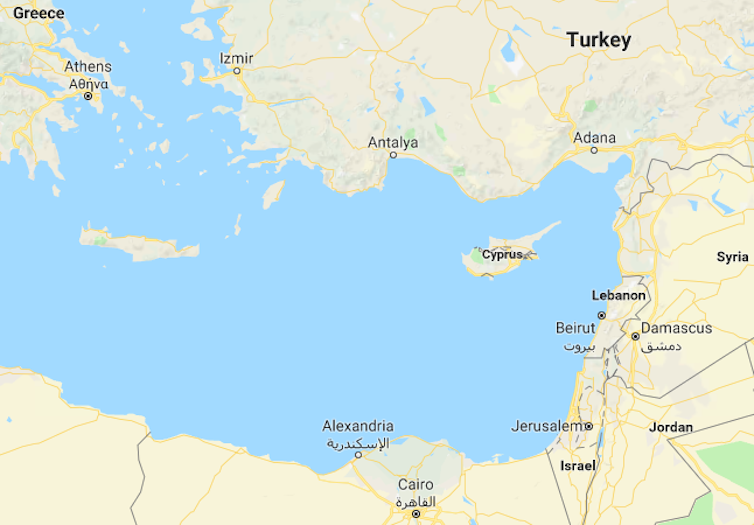[GGP] Scramble for gas in eastern Mediterranean is stoking old tensions in the region
The Turkish navy blocking a drilling ship from exploring for gas off Cyprus ought to make international headlines, but it has gone almost unnoticed at a time of such conflict in the region. The ship has been marooned while diplomats from several European countries try to broker a solution between Turkey and Cyprus.
The blockade relates to claims and counter claims over the rights to explore the waters off this troubled island. It is just one of a number of conflicts between Turkey, Cyprus, Greece, Egypt, Israel and Lebanon that have arisen since huge reserves of gas began to be discovered in the eastern Mediterranean in 2009. What started as a promising opportunity for cooperation is instead fuelling existing tensions.
Peaceful and cooperative gas exploration should have been attractive to these countries. Conventional wisdom suggested natural gas would be in high demand because it is cheaper than renewable energy but with lower carbon emissions than oil and coal.
Yet despite these countries rushing to explore their waters, historic animosities have prevented them from reaching a multilateral agreement with each other demarcating the boundaries or exclusive economic zones in their respective waters. Instead, they have signed various bilateral agreements, clarifying positions between some countries but not with others.
Global enthusiasm for gas has since waned somewhat. Renewable energy sources like wind and solar have become drastically cheaper, while coal has had enough political clout to stay in business. Consequently, a gas glut made prices weaker than the industry had hoped. Arguably, this should still incentivise these Mediterranean countries to cooperate to share the costs of exploration and export infrastructure. It is not playing out that way, however.
The Cyprus problem
The Republic of Cyprus has reached demarcation agreements with Egypt, Lebanon and Israel. Yet drilling has been complicated by relations with the Turkish Cypriot community’s administration, which is recognised only by Turkey. After talks to reunify the island collapsed last July, mutual distrust is on a high.
The Turkish Cypriots are concerned about being cut out of the gas bonanza, but their main interest is reunification. They believe that if the two sides on the island were jointly exploring and taking the gas to market, the majority of the Greek Cypriot community would agree to a reunification deal they have opposed in the past. This, they argue, would redress the historic mistake of the EU granting the south exclusive membership in 2004 without insisting on a solution to the 1974 division conflict.
The Turkish Cypriots have been using their claims over the territorial waters to try and force cooperation. The Turkish Cypriot deputy prime minister, Kudret Özersay, said recently that exploration would no longer be permitted by the north without either a north-south agreement over gas or a full settlement of the wider island issue.
Google Maps
Turkey followed up with a statement saying it would not tolerate unilateral exploration by Nicosia, whose authority it doesn’t recognise. Besides wanting to shore up the Turkish Cypriots, Turkey sees the eastern Mediterranean as a “blue homeland” for its own growth ambitions – and related concerns about domestic energy security. Worse, Turkey watches the tighter cooperation between Nicosia and more powerful neighbours like Israel, Egypt and Greece in matters as sensitive as energy with growing unease.
Relations between Turkey and Greece, the region’s oldest maritime rivalry, have also started being affected by gas politics – together with a row over Greece granting asylum to officers suspected of aiding the attempted coup in Turkey in 2015. In a separate incident to the blocking of the drilling ship, a Turkish vessel rammed a Greek ship in the Aegean earlier this month. Greek foreign minister Nikos Kotzias vowed to defendits maritime borders, linking the matter to Turkish activities in Cypriot waters.
These tensions threaten an additional problem for Turkey. The EU is looking at constructing a gas pipeline from the region to mainland Europe via Crete. Turkey already has the pipeline infrastructure to export the region’s gas to Europe easily and cheaply, but this new pipeline would bypass the country and turn Cyprus into a competing energy transfer hub – potentially including gas from Israel and Egypt.
This prospect has made no difference to the fate of the blockaded drill ship, however. The marooned vessel, which is owned by Italy’s Eni, looks set to sail elsewhere – albeit other exploration work by France’s Total and US giant MobilExxon remain on the schedule.
Other wrangles
Old conflicts are also complicating gas exploration elsewhere in the region, notably the one between Lebanon and Israel. Like with Turkey/Cyprus, negotiations are made more difficult by these countries not recognising one another diplomatically. Lately, Israel has beenmaking threats following Lebanon’s decision to launch an exploration tender in disputed waters.
Egypt is meanwhile sitting on the largest gas discovery in the region. The Zohr field has an estimated 30 trillion cubic metres of gas, and Egypt is keen to use it to fuel a domestic development boom to stabilise the military regime. But President Abdel Fattah al-Sisi is having to contain domestic opposition to Egypt’s expanding energy cooperation with Israel, which has invited attacks on the country’s energy infrastructure in the past.
Tensions are also simmering with Turkey over Egypt’s cooperation with Cyprus. The mutual resentment between Turkey and Egypt has never really thawed since the ousting of the Turkey-friendly Muslim Brotherhood government in 2013. Most recently, Turkey declared the demarcation agreement between Egypt and Cyprus null and void for allegedly violating Turkish territorial waters.
President al-Sisi (left) meeting his counterparts from Greece and Cyprus at summit last December. EPA
Some countries that discover oil and gas turn into hydrocarbon-rich economies. For others it becomes a resource curse, leading to endless corruption, civil wars and domestic tensions. For the countries in the eastern Mediterranean, the promise of offshore wealth has made the region’s fragile geopolitics yet more complex. If they are going to turn their vast gas potential into economic and fiscal benefits, regional actors are going to have to find new solutions to old problems before tensions rise any further.
Clemens Hoffmann
Lecturer in International Politics, University of Stirling
Attribution-NoDerivatives 4.0 International (CC BY-ND 4.0)
The statements, opinions and data contained in the content published in Global Gas Perspectives are solely those of the individual authors and contributors and not of the publisher and the editor(s) of Natural Gas World.





